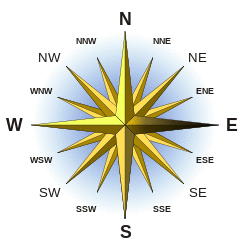
East is one of the four cardinal directions or points of the compass. It is the opposite direction from west.
Etymology
As in other languages, the word is formed from the fact that east is direction where the sun rises: east comes from Middle English est, from Old English ēast, which itself comes from the Proto-Germanic *aus-to- or *austra- "east, toward the sunrise", from Proto-Indo-European *aus- "to shine," or "dawn", [1] cognate with Old High German *ōstar "to the east", Latin aurora 'dawn', and Greek ἠώς ēōs 'dawn, east'.[2] Examples of the same formation in other languages include Latin oriens 'east, sunrise' from orior 'to rise, to originate', Greek ανατολή anatolé 'east' from ἀνατέλλω 'to rise' and Hebrew מִזְרָח mizraḥ 'east' from זָרַח zaraḥ 'to rise, to shine'. Ēostre, a Germanic goddess of dawn, might have been a personification of both dawn and the cardinal points.
By convention, the right hand side of a map is east. This convention has developed from the use of a compass, which places north at the top. However, on maps of planets such as Venus and Uranus which rotate retrograde, the left hand side is east.
To go east using a compass for navigation, one sets a bearing or azimuth of 90°.
Cultural
East is the direction toward which the Earth rotates about its axis, and therefore the general direction from which the Sun appears to rise. The practice of praying towards the East is older than Christianity, but has been adopted by this religion as the Orient was thought of as containing mankind's original home. Hence, some Christian churches have been traditionally oriented towards the east.[3][4]
The Orient is the East, traditionally comprising anything that belongs to the Eastern world, in relation to Europe. In English, it is largely a metonym for, and coterminous with, the continent of Asia, divided into the Far East, Middle East, and Near East. Despite this Eurocentric origin, these regions are still located to the east of the Geographical centre of Earth.
Within an individual city, the east end is typically poorer due to prevailing winds blowing pollution to the east.[5]
See also
References
- ^ "east". Online Etymology Dictionary. Retrieved 3 December 2013.
- ^ "east". Merriam-Webster. Retrieved 3 December 2013.
- ^ "Orientation of Churches". Catholic Encyclopedia. Retrieved 3 December 2013.
- ^ Peters, Bosco (30 April 2012). "Architectural Design Guidelines 1". Liturgy.co.nz. Retrieved 3 December 2013.
- ^ Benedictus, Leo (12 May 2017). "Blowing in the wind: why do so many cities have poor east ends?". The Guardian. Retrieved 2 October 2019.